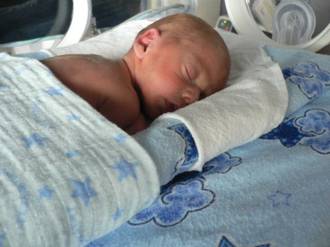Shop
01439
https://www.under5s.co.nz/shop/Hot+Topics+Articles/Health+%26+Wellbeing/Premature+babies++born+too+soon.html
Premature babies – born too soon?
|
Statistics show that 1 in 10 New Zealand babies arrive in the world too soon. The outlook for premature babies has improved dramatically in recent years, but despite medical advances, figures are on the increase. Learn about pre-natal complications, neonatal intensive care, early challenges and learning and development issues.
|
You might also be interested in ...
5 Tips on bathing your baby
At first, bathing your baby may seem like a huge undertaking, with all the things you have to remember. Don’t panic! It won't be long before it becomes a routine. Check out these useful tips to help make bath time a little easier.
5 Tips for healthy kids teeth
Check out these tips on how to keep your kids' teeth healthy. From dental care to brushes, brushing and the effects of food, drink and medication.
join usJoin us on social media for all our latest news. |
sign upSign up and receive our latest newsletters. |
|







Introduction
Statistics show that 1 in 10 New Zealand babies arrive in the world too soon.The outlook for premature babies has improved dramatically in recent years, but despite medical advances, figures are on the increase.
Babies that are born after 38 weeks gestation and weigh between 2,500 and 3000 grams have the best chance of healthy development. About half of extremely premature babies weighing less than 500 grams survive.
However, the complications are often greater for smaller, less mature babies than for those born at term. Many will face serious medical conditions such as lung disease, cerebral palsy and immune system disorders.
Very often, the effects may not be discovered until the baby is born or until the child moves into childhood. Sometimes the effects do not become apparent until adulthood.
It is important for parents and practitioners to know that the development of the premature baby may be vastly different from that of the full-term baby. Almost half will grow up with moderate to severe difficulties in verbal, reading, writing and mathematical skills and poor motor co-ordination.
Some may also suffer from physical disabilities that may require life-long care. About 25% will grow up with some form of visual or hearing impairment as well as lower than average cognitive development and IQ. One in 4 babies faces the risk of autism. The rest will be unaffected.
Pre-natal Complications
Risk factors that may bring about early delivery include pre-eclampsia, pregnancy-induced diabetes, infection, hormonal imbalances, a weak or inflamed cervix and twin or triple foetuses.Research shows that the mother’s age, smoking, alcohol, drugs, over strenuous physical activity, stress and lack of nutrients can also induce preterm delivery.
Some experts believe the intensive use of fertilizers and pesticides to be responsible for the increase in premature births.
Neonatal Intensive care
Babies born extremely early are intensely fragile and vulnerable with immature organs, under-developed lungs and gelatinous skin. They also lack the body fat necessary to maintain their body temperature.Premature babies often begin their lives in an incubator, which keeps them warm, decreases the risk of infection and limits water loss. Special equipment carefully monitors the baby’s blood pressure, breathing, heart rate and oxygen levels.
Because premature babies are unable to suck or swallow properly until they are 32 to 34 weeks gestational age, they may be tube-fed with the mother’s milk or special formula fortified with additional vitamins and minerals to help them grow and stay healthy.
They also need extra iron to make haemoglobin, the oxygen-carrying component of red blood cells. Without sufficient iron, the baby’s body can't make enough red blood cells to bring oxygen to the tissues and organs to enable them to function properly.
The risk of infection is also very high in premature babies. Frequent hand washing and preventative medicines are all-important. If
the baby has a birth defect such as a cleft palate or a club foot, treatment will begin as soon as the baby’s breathing and heart rate is stabilized. This can take weeks depending on the severity of the baby's condition.
Early challenges
BreathingDue to the immaturity of the part of the brain that controls breathing, some premature babies develop Respiratory Distress Syndrome (RDS).
Babies born before 34 weeks gestation have about five percent of the total surfactant that they need, which puts them at high risk for RDS. Treatment involves the use of an artificial surfactant, which helps the lungs to expand properly after birth. Getting adequate oxygen to the brain is critical for brain development.
A link has now been established between breathing difficulties at birth and the development of attention deficit hyperactivity disorder (ADHD).
Jaundice
Jaundice is another common complication. The condition results from high levels of bilirubin, which arises from the natural breakdown of blood. Because the liver is still immature, adequate amounts of bilirubin cannot be removed from the blood, which leads to yellow discolouration of the skin and the whites of the eyes.
High levels of bilirubin can cause deafness, cerebral palsy and other forms of brain damage if left untreated. Placing the baby under a special light can help the body eliminate the compound.
Vision
Premature babies that weigh less than 1250 grams at birth often suffer from retinopathy of prematurity, a condition in which the small blood vessels in the eye grow abnormally. The result may range from the need to wear glasses to severe blindness.
Crossed eyes (strabismus) are also common in premature babies, although movement activities can help to correct the problem as the baby grows and develops.
Regular checks
Babies born extremely prematurely may not grow at the same rate as a full-term baby for the first two years and weight gain needs to be carefully monitored. There is some evidence to suggest that children who are born small, but whose growth catches up in the first year, may have fewer health problems than children who remain small.Premature babies are more likely than full-term babies to have visual and hearing difficulties and regular examinations are important.
Some premature babies may have problems with the tone and positioning of their muscles. As a result, normal milestones such as sitting, crawling and walking may be delayed.
Early experiences
Considerable disagreement exists between researchers over optimal conditions for the premature baby.Some researchers believe that stimulation may be harmful while others believe that early intervention can make a dramaticdifference to overall development and future learning potential.
However, the one thing that the experts agree on is the provision of a nurturing, loving environment.
Early contact with the premature baby is crucial in fostering physical and emotional development.
Some studies have shown increases in length and head circumference growth, weight gain and bone mineral density following massage and touch therapies.
Massage has an important emotional element for parents and family members because it provides an opportunity for them to form a loving bond with their baby.
The following strategies can be very helpful in fostering the parent-baby bond and in stimulating the baby in a loving and caring way:
• Massage
• Skin-to-skin contact
• Rocking and cuddling
• Hand containment
• Swaddling (now standard practice in many baby care units)
• 'Kangaroo care' (warmth, heartbeat and smell)
• Baby talk or parentese
• Songs, rhymes and lullabies
• Soft fabrics, natural wool and cotton
• Familiar smells such as those of the mother, father and family members
• Soft lighting
• Classical music
Research shows that premature babies cared for in this way gain weight more quickly than those left in their cots or incubators. They are also more alert and cry less.
Brain development
The last 3 months in the womb are critical for optimal development of the brain, which quadruples in size in the last trimester. If the baby is born before 32 weeks gestation, some parts of the brain may fail to develop after birth.Magnetic resonance scans show the cortex (surface area of the brain) to be much smoother than the brain of a baby born at full term, which takes on a rippled appearance.
The most affected part is the prefrontal cortex, which sits just behind the forehead. This area of the brain is important for intellectual functions such as attention, memory, planning, mood and social functioning.
The prefrontal cortex of the premature baby may contain about 30% less thinking cells and far fewer nerve fibre connections. This might explain why children born prematurely are more prone to physical, neurological, behavioural and learning difficulties when they go to school. They may also have a lower average IQ than a full term baby.
Learning and developmental delays
The earlier the birth, the higher the likelihood of the following disorders or difficulties:• Poor socialization skills such as making and keeping friends
• Physical co-ordination difficulties
• Behavioural problems including hyperactivity, inability to concentrate,
stubbornness, impulsiveness and anxiety
• Lack of imagination and curiosity
• Poor memory
• Inability to understand concepts such as time and money
• Poor speech and language comprehension
• Poor problem-solving skills
• Learning difficulties
Boys are more likely to suffer severe or moderate developmental and learning delays than girls, which supports the concept that male sex is an important biological risk factor in extremely preterm babies. Boys are also more likely than girls to suffer from behavioural problems.
In trying hard to learn, boys may become frustrated by failure and would rather be seen as behaving unacceptably than having poor learning abilities. Despite the high incidence of learning difficulties, most preterm children keep up with their peers and do reasonably well at school.
Strategies for practitioners
Knowing the gestational age of the baby at birth enables practitioners to devise strategies to support the learning and development of children that may need extra support.Involving parents in the planning can also have very positive results. Parents better understand how to cope with their child’s learning or physical disabilities and can suggest ways in which knowledge, experience and interests can be extended.
For children with a hearing or speech impairment, teaching them sign language can help them to express their needs and wants. Sitting the child beside the practitioner at story time can also enhance enjoyment and participation and help reduce frustration.
Children with a visual impairment need good lighting in order to see and extra time for functional tasks. Some children find visual concentration easier when pictures, words, or numbers are large and spaced well apart. Some children see the movement of objects better than stationary objects.
The provision of cause and effect toys, puzzles with wooden handles, tactile materials, interactive games and ICT can help visually impaired children to achieve their cognitive potential.
Specially designed materials, furniture and equipment can be developed to meet the needs of children with physical difficulties. Activities, such as dressing up, puppetry, games and sports, picnics, outings, outside play, rhymes, songs, music and ICT can strengthen the child's self-confidence.
Having a creative area, where children can paint, explore water, sand, woodchips, soil, dough, clay and other materials and tools helps them to express themselves, to communicate and to have fun. All these things are essential for healthy development.
Check out our other Hot Topics on:
Source: Dr. Lin Day, Baby Sensory.